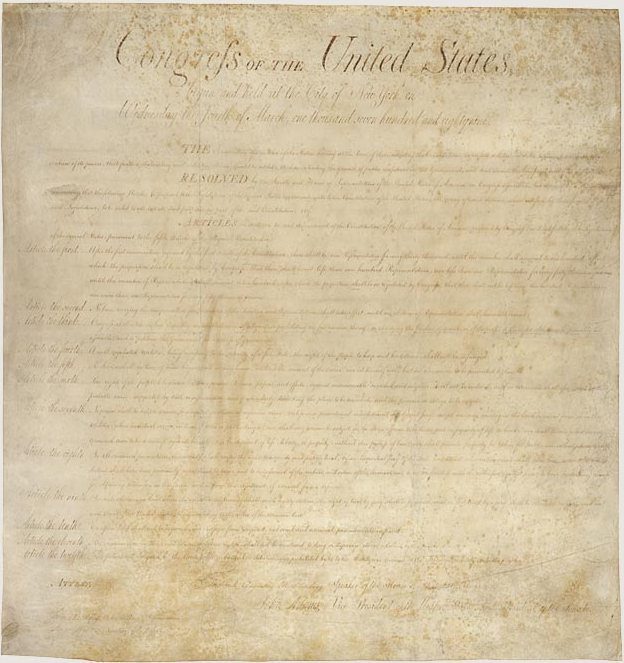1st Amendment -
The Opening Phrase
The Opening Phrase of the 1st Amendment is "Congress shall make no law." This phrase has several important implications. The fact that it mentions Congress specifically means that these restrictions are placed upon the government only and not on individuals. For example, the Congress cannot make a rule prohibiting certain types of speech, but an individual may. Thus a parent could forbid his child from talking about certain things, or an employer could punish employees for talking about a particular topic, such as illicit sexuality, and this right would be protected. This opening statement places a restriction only upon Congress and not upon individuals who try to restrict the activities of those under their authority.
Likewise, the 1st Amendment does not say that the states cannot restrict these liberties. Indeed, for the first 100 years of the United States, the Bill of Rights was explicitly understood to restrict only the power of Congress and not of the states. Thus, the states could create laws dealing with religion, freedom of speech and the press, etc. - a very different approach to what we are used to today. So what changed?
The answer is - the Civil War. After the Civil War, the Republican Congress was very intent to protect the rights of African Americans who had recently won their freedom. President Abraham Lincoln was a Republican, as were most of the abolitionists in the North. The party of the slave holding South was the Democrat Party. Consequently, nearly all former slaves became Republicans after the war.
The Republican Congress moved to pass certain amendments to the Constitution that guaranteed protection for the rights of all African Americans. After the war, southern States began to pass "Black Codes" limiting many rights of African Americans, such as the right to possess arms, the right to travel and the right to vote. In response, the Republican Congress passed the 14th Amendment which guaranteed equal rights to all citizens.
The 14th Amendment specifically restricts the states from granting unequal rights to anyone. Remember that for the first 100 years of the United States' existence, the Bill of Rights applied only to the federal government. Now with the 14th Amendment's specific restriction on the states from discriminating against any citizen, the courts began to gradually apply all of the restrictions in the Bill of Rights to the states as well.
How? By the "Due Process" clause in the 14th Amendment which states that all citizens must receive "due process of law." Gradually, one by one, most of the rights listed in the Bill of Rights were incorporated into the list of restrictions applied against the state governments. You can read the 14th Amendment here.
You can learn more about how the rights listed in the Bill of Rights were incorporated against the states by reading our 9th Amendment article.
Read about other clauses of the First Amendment:
Establishment Clause
Free Exercise Clause
Freedom of Speech Clause
Freedom of the Press Clause
Freedom of Assembly Clause
Freedom of Petition Clause
Amendments:
Preamble to the Bill of Rights
Learn about the 1st Amendment here.
Learn about the 2nd Amendment here.
Learn about the 3rd Amendment here.
Learn about the 4th Amendment here.
Learn about the 5th Amendment here.
Learn about the 6th Amendment here.
Learn about the 7th Amendment here.
Learn about the 8th Amendment here.
Learn about the 9th Amendment here.
Learn about the 10th Amendment here.
Learn more about the Bill of Rights with the following articles:
- Main Bill of Rights page.
- For a brief synopsis of the First Ten Amendments.
- Learn about the Purpose of the Bill of Rights here.
- Read about the History of the Bill of Rights here.
- Look at the Bill of Rights in Pictures here.
Last updated 7/30/12
Return to top of 1st Amendment Opening Phrase
Revolutionary War and Beyond Home
Like This Page?
© 2008 - 2022 Revolutionary-War-and-Beyond.com Dan & Jax Bubis











Facebook Comments